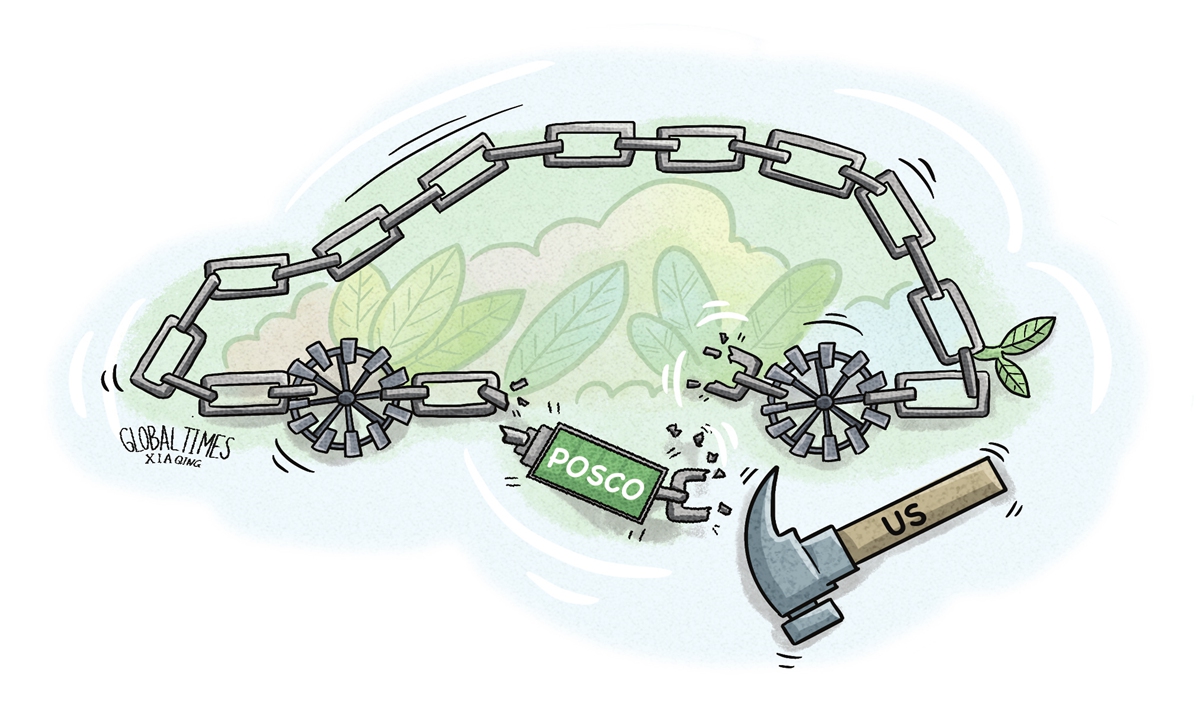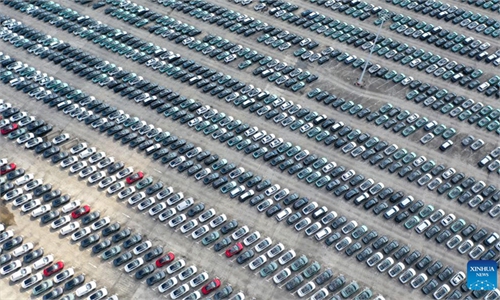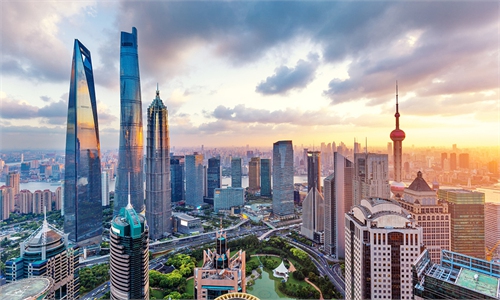
Illustration: Xia Qing/Global Times
South Korean conglomerate POSCO is "leading a push" to move production of battery materials from the Chinese mainland to its home country, the Financial Times reported on Monday.If the report turns out to be true, the purpose of the move is likely to enjoy subsidies offered by the US, but the firm will learn a lesson sooner or later: By following the US strategy to "decouple" from China, POSCO will basically end up becoming cannon fodder in the US' aggressive policy of containing China.
US President Joe Biden's flagship climate legislation, the Inflation Reduction Act, offers tax credits to electric vehicles (EVs), but only certain models are eligible for the credit, as the law stipulates certain manufacturing and final assembly requirements. It is an extraordinarily complex statutory framework that the Biden administration is working with.
Stringent requirements mean only a few models are eligible for full tax credits. Even if some companies choose to "decouple" from China's industrial chain, it is still uncertain whether they will receive US subsidies and how much they will receive, if any.
Compared with the uncertain industry subsidies offered via the Inflation Reduction Act, China's industrial chain advantages, huge consumer market and production cost advantages bring tangible benefits to enterprises. China's EV industry is the largest in the world.
China not only is the world's largest EV market but also controls much of the supply of critical minerals needed to make EV batteries. Some analysts believe China has cornered the market on the minerals, metals, cathodes and anodes that go into batteries. One thing is clear: It would be foolish to "decouple" from China's supply chains and the world's largest EV market.
In the past few months, it has been seen that the US government says one thing and does another. On the one hand, politicians in Washington have said the US has no interest in economic "decoupling" from China. On the other hand, they have persuaded US allies to be the vanguard of the US' "decoupling" strategy, and forced them to bear the losses of "decoupling" from the Chinese economy.
In the face of the geopolitical tricks played by some in the US, companies in Asian countries should remain vigilant and avoid becoming cannon fodder in Washington's geopolitical game.
Supply chain restructuring is a natural process. Companies are free to move production out of China, or out of anywhere for that matter. However, in this process, there should be no artificial intervention, and the US' geopolitical interests in particular should not be a force to disrupt the organization of the Asian industrial chain. While US officials have stressed the point of "reducing dependency on China" with the Inflation Reduction Act, the move is more like a US trick to use subsidies as bait to lure global competitors by disrupting the whole supply chain.
China has a complete industrial chain, as well as well-developed logistics and support systems, and China is increasingly becoming an innovation force to be reckoned with. China's EV market has been developing rapidly in recent years, with a growing number of market participants and competition in the industry. China's advantages in the sector are growing, not shrinking. If some foreign companies are willing to fall into the US trap and "decouple" from China, the market gap they leave behind will soon be filled by Chinese companies.
Efforts have been made to accelerate the building of China's self-reliance and strength in science and technology to resolve the issue of foreign technology strangleholds. Chinese companies' capabilities have increased. They have the ability to replace Western companies in various fields, if these Western companies choose to "decouple" from China. Companies from all over the world are welcome to further expand investment in China and deepen cooperation to achieve common development. But if foreign companies choose to "decouple" from China, they will have to swallow the bitter pill that will definitely harm their own interests.
The author is a reporter with the Global Times. bizopinion@globaltimes.com.cn



